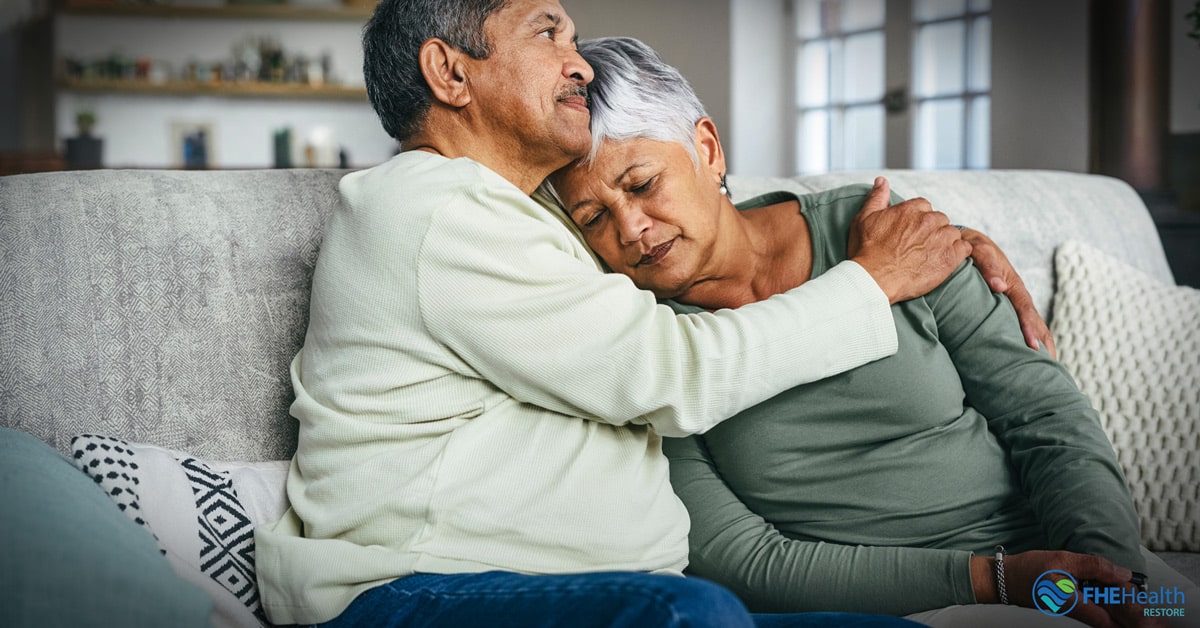Healthy relationships require lots of care and attention. But when depression is added to the mix, they become much more difficult to maintain. Unfortunately, persistent sadness in relationships is a reality for many.
Nearly 10% of U.S. adults suffer from depression, making it one of the most common mental illnesses in the country. Like other mental disorders, depression touches all aspects of a person’s life. For those with the condition, even intimate relationships aren’t safe from its effects.
Luckily, there’s hope for partners struggling to cope with depression. With the right help, you can get back to a loving, fulfilling relationship. To start, here’s what you need to know about depression and relationships.
Depression and Sadness in Relationships
Intimate relationships are among the things most affected by depression. The disorder is often cyclical and tends to feed on itself if left unchecked. Depression can lower the quality of a relationship, ultimately triggering a deeper sadness. External factors can exacerbate the condition, which can affect both partners negatively.
Depression doesn’t look the same for everyone. The symptoms of this disorder can manifest in a variety of ways, and with varying degrees of intensity. Some people may experience it in relation to other health concerns (such as premenstrual dysphoric disorder), while others endure regular waves of sadness.
A person with depression may withdraw from their partner when the condition is particularly bad. While this typically doesn’t reflect a loss of love, it may be hard for the unaffected partner to avoid taking the withdrawal personally.
Effects of Depression on Relationships
If you’ve found yourself thinking, “My depression is ruining my relationship!” you’re not alone. While depression is a personal condition, it can seriously affect those close to the person who has it — especially their romantic partner.
Physical touch is part of any healthy relationship, but depressed partners might have little desire to be physically intimate. They may withdraw emotionally, sometimes to the point of isolation. You might also notice your partner neglecting daily tasks or appearing indifferent to things they once found joy in.
Depression might also lead to more conflict in your relationship. Whether it’s in response to the above symptoms or simply because tensions are high, you may suddenly find it hard to get along.
How to Help a Depressed Partner
Life with a depressed partner has its ups and downs. You’ll likely feel inclined to care for them but may not know how to — especially if you’ve never suffered from depression yourself.
It’s important to note that depression is a serious medical condition that often has nothing to do with a person’s romantic partner. While it may feel like rejection at times, recognizing depression as an illness that requires treatment can help you cope.
There are some ways you can support a depressed partner. Beyond seeking professional help, here’s what you can do yourself.
Show Empathy
Depression can be a lonely condition. If your partner is suffering, one of the best things to do is acknowledge their pain.
This can be as simple as offering your support verbally. Those with depression often feel guilty about their condition. Letting your partner know you see and empathize with their struggle can mean the world to them.
Physical closeness may also provide comfort — even a hug can be enough to remind someone they’re not alone. And if your partner feels like opening up, listen without judgment. Being a good listener to your partner can help them feel supported and heard.
Encourage Healthy Choices
For those with depression, even the smallest task can seem like an insurmountable feat. Things that were once automatic, like cooking or cleaning up, suddenly become impossible.
As a partner, you can give your support by taking on a greater share of daily tasks. Besides cooking and household chores, making appointments is also a great way to help out. For some, this may be the only way they’ll agree to seek the treatment they need.
When your partner’s symptoms become too severe, encouraging healthy choices like this can make a big difference. It helps them meet their basic needs and may keep them grounded with your presence.
Care for Yourself
Even if you aren’t suffering from depression yourself, caring for someone with a mental illness can be draining. And while supporting your partner is important, maintaining your own health is the top priority.
Make sure you set aside time each day to care for yourself. Whether this means going to the gym, pursuing a hobby or spending time with friends, self-care can help you protect your mental and physical health.
Therapy is also a useful resource. It’s natural to experience anger or sadness in a relationship with someone who’s depressed. But without the right outlet, these feelings could turn into something unhealthy. It’s hard to give yourself to others when your own needs aren’t met, but therapy may help you learn strategies to help and cope with stressors.
Managing Depression in Relationships: Seeking Professional Support
When it comes to depression, there’s no substitute for professional support. No matter how much you give, it may not be enough to help your partner. To make a full recovery, seeking treatment is the best course of action — for you and your loved one.
While helping your partner is an admirable goal, giving too much can put your own mental health at risk. Seeking professional help means you won’t have to shoulder the burden alone. The right team can help your partner get their life back and give you the relationship you’ve been missing.
Managing a relationship with depression is a challenge, but you don’t have to do it alone. The team at Restore Mental Health is standing by to give you the support and guidance you need. It’s never too late to rid your relationship of depression. Contact us today to learn how.



